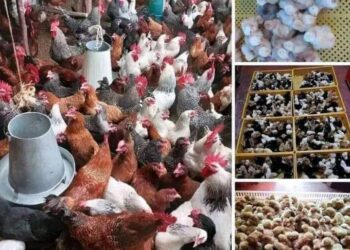Livestock are animals that are domesticated primarily for human consumption. In Nigeria, the common livestock are poultry birds, cattle, goats, sheep, pigs, and rabbits. There are also camels, horses, and donkeys in parts of the North. The most commonly reared ones are chickens, cattle, goats, and sheep. All these animals were reportedly raised in free-range production systems, which comprise small holders and nomadic herders.
The role of livestock in Nigeria’s socio-economic development cannot be overemphasised. Demand for livestock products has helped farmers expand their businesses, resulting in increased income. Employment opportunities are created for farm workers, as well as broad livestock value chain expertise and services.
Cattle, donkeys, camels, and horses serve as means of transportation and are also utilised by local farmers as draft animals for land preparation (tilling, plowing) in agricultural crop production, improvement of livelihoods, poverty eradication among rural dwellers and herders, and earning foreign exchange for the country.
Therefore, there is the need to establish a ministry of livestock due to climate change, which caused insufficient food for the animals, ecological changes, fast population growth, which triggers high demand for milk, meat, and others, importing of livestock products, and farmers-herders conflict.
Nevertheless, apart from the oil sector, which Nigeria depends on as its main source of income, the livestock sector, if properly managed, will play a crucial role in Nigeria’s GDP. Agricultural experts have for long been advocating increased government’s investment in the agriculture sector as an alternative to oil due to the volatility in crude oil prices at the global market.
If the long-standing farmers-herders conflict is resolved by setting up ranches across the country and by increased government’s investment in the sector, the high cost of livestock products such as milk and beef will be reduced, improving livelihoods. Diseases like anthrax will be eliminated by proper vaccination and treatment. After all, the nomadic herders will settle for a static location and enroll their children in school.
Usman Umar,
Mass Communication Department,
University of Maiduguri,
Borno state




